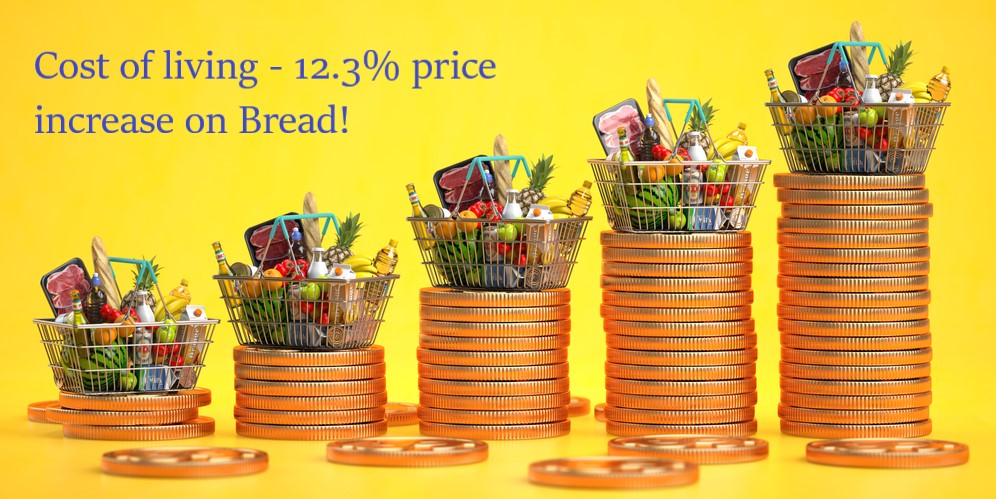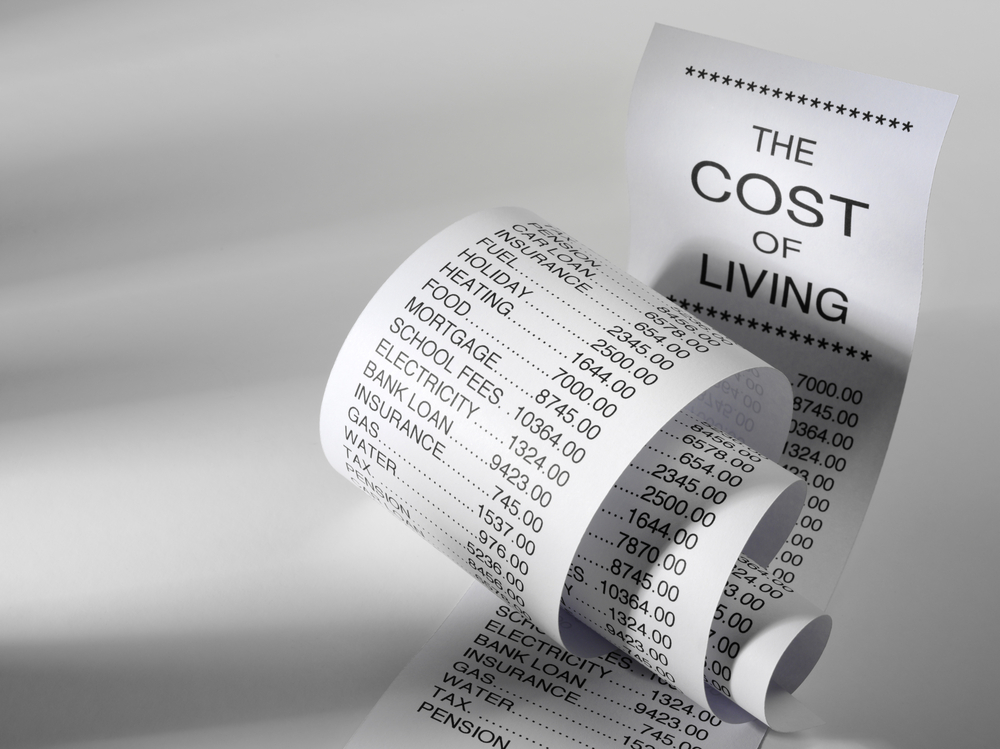
Food shopping and 10.1% UK Inflation
On the 17th August 2022, the Office of National Statistics (ONS) reported that Inflation had hit 10.1%. This is the highest level for 40 years. This increased from June, where it was 9.4%.
The largest contribution factors to this increase are food and non-alcoholic drinks. Rising energy costs, petrol and diesel costs are also affecting the inflation figure.
But what does this mean?
What is Inflation?
When we talking about Inflation in terms of the economy, we are discussing the difference in pricing on goods year on year.
For example if a loaf of bread cost £1.00 last year and is now £1.10, this is an inflation of 10%. However the increase on bread and cereals in July 2022 is 12.9%. The inflation change on milk, cheese and eggs is 19.4%. These inflation increases have a detrimental affect on the cost of living, making managing household budgets difficult.
| 2021 | 2021 | 2022 | 2022 | 2022 | 2022 | 2022 | 2022 | 2022 | |
| Nov | Dec | Jan | Feb | Mar | April | May | June | July | |
| Food and non-alcoholic beverages | 2.5 | 4.2 | 4.4 | 5.1 | 5.9 | 6.7 | 8.7 | 9.8 | 12.7 |
| Alcoholic beverages and tobacco | 4.8 | 4.0 | 3.3 | 3.6 | 4.8 | 4.4 | 5.1 | 4.7 | 5.5 |
| Clothing and footwear | 3.5 | 4.2 | 6.3 | 8.8 | 9.7 | 8.2 | 6.9 | 6.1 | 6.6 |
| Housing, water, electricity, gas and other fuels | 3.9 | 4.0 | 4.2 | 4.3 | 4.6 | 8.6 | 8.7 | 8.9 | 9.1 |
| Furniture, household equipment and maintenance | 6.2 | 7.4 | 8.5 | 9.2 | 10.4 | 10.7 | 11 | 10.4 | 10.2 |
| Health | 1.5 | 2.4 | 2.2 | 2.6 | 2.5 | 2.1 | 1.8 | 1.6 | 1.3 |
| Transport | 12.5 | 12.1 | 11.6 | 11.7 | 13.6 | 13.7 | 14 | 15.2 | 15.1 |
| Communication | 1.3 | 0.8 | 1.1 | 1.1 | 0.7 | 2.7 | 2.7 | 2.9 | 3.1 |
| Recreation and culture | 3.3 | 3.0 | 2.9 | 4.7 | 5.0 | 5.9 | 5.0 | 4.8 | 5.6 |
| Education | 4.5 | 4.5 | 4.5 | 4.5 | 4.5 | 4.5 | 4.5 | 4.5 | 4.5 |
| Restaurants and hotels | 5.3 | 6.0 | 4.7 | 5.0 | 6.9 | 8.0 | 7.6 | 8.6 | 9.0 |
| Miscellaneous goods and services | 1.5 | 1.7 | 1.6 | 1.8 | 1.8 | 2.7 | 2.8 | 3.1 | 4.0 |
Autumn Inflation forecast is 13.3%
According to the Bank of England, Inflation will continue to rise this year. They are predicting that we won’t see a drop in Inflation for around two years.
Prices have gone up for many reason, however the Russian and Ukrainian conflict is the major contributor:+
- there has been a sharp rise in energy bills, as the wholesale cost increasing globally
- increase in petrol and diesel prices, partly due to increase in cost of crude oil
- the cost of weekly food shopping has gone up, as basic essentials have seen a sharp price increase – such as milk, bread, butter, flour, pasta. Grain production and production costs being blamed.
- increases in raw material costs for producing household goods and furniture
- as with other industries, bars and restaurants are having to pass on to their customers the increase in costs to their customers
- with increased inflation, comes higher mortgage rates for home owners. This is increasing the cost of mortgage payments
Check how much the inflation will affect you – click here

Using cash to manage spending
A recent review by the Cash Action Group, initiated by the Government, is showing that the use of cash has gone up 20%.
During the covid pandemic lockdowns, consumers and businesses reverted to using cards only, as a way to slow down the transmission of the virus. Since the increase in the cost of living, consumers are reverting back to cash. The Post Office reports in July 2022, it handled £801m in personal cash withdrawals. Since they started keeping records 5 years ago, this is the highest amount of cash that has been withdrawn.
Using cash to manage spending is an easier way to ensure you have enough for weekly bills. Most individuals now bank online, with banks offering online banking as a way to have full 24/7 access to your balance. Leaving enough in your bank to pay your direct debits, and taking the remaining cash out, is easier for some to manage. Allocating cash to different expenditures can be easier than trying to keep track when it is your bank.
What help is there?
The Government has laid out a number of ways it is going to help households. In February 2022 it announced an Energy Bill package to help house holds manage the rising energy costs. In May 2022 this was updated to the Cost of Living support package.
There is further helped be laid out for lower income families and pensioners, as they are more vulnerable to the cost of living increase. On 23rd August 2022, the Government announced six million disabled will get £150 towards cost of living.
In some cases taking out a loan could help stem a temporary cash flow issue. Before doing so always check how much you can afford by using our affordability calculator.
